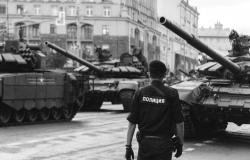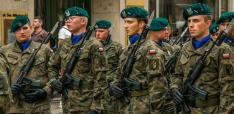Russia’s Recent Invasion of Ukraine: the Just War Perspective

Hans Gutbrod argues that all interpretations of Russia's invasion of Ukraine point to a radical change of paradigm for international relations.
Public and international revulsion at the recent Russian invasion of Ukraine is widespread. The Kremlin has received comprehensive international condemnation for its actions, with only few allies siding with the Russian government. Another way of examining Russia's invasion is through just war theory, a tested framework for assessing the ethical aspects of the use of force.
Against this standard, Russia's recent invasion does not look good even in the most generous interpretation. The first ethical test is Ius ad Bellum, whether the use of force is justified in the first place. The Kremlin's actions fail that test.
Failing – Ius ad Bellum
The invasion has a cause that is intelligible, but it is not just. It is understandable that the Kremlin would prefer Ukraine not to turn towards NATO and the EU. It is also legitimate for the Kremlin to advocate and push for Ukrainian neutrality and to declare its sphere of interest. Yet legitimate interests do not, by themselves, make a just cause for using force. A just cause presupposes the righting of a grievous wrong so that a more lasting peace can be achieved.
The stated aims of Russia's ‘special operation’ do not amount to a right intention. None of the three goals that Vladimir Putin highlighted in his original speech are a plausible intention. The ‘demilitarization’ of a state that does not pose a threat is an attempt at subjugation, not a step towards a better peace. It is implausible, at best, that a state that is governed by a president of Jewish descent requires ‘denazification’. The third goal of putting ‘to justice those that committed numerous bloody crimes against peaceful people, including Russian nationals’ remains farfetched. Whatever one makes of the events that Vladimir Putin mentioned in other contexts, including the incident in which dozens of pro-Russian protesters died when a building was set ablaze in Odessa in 2014, there are numerous international legal instruments for pursuing redress.
The supplementary claim that military action was intended to prevent ‘genocide’ seems to have come up in Russian state media only from mid-February, after close to 200,000 Russian troops had already been massed by Ukraine's borders, as Paul Goode has shown with a detailed analysis of the rhetoric in Russia's popular TV channels.
Moreover, the recent invasion fails the test of being proportional to any potential grievance. Even if there were merits to some of Russia's claims, they are not proportional to unleashing an invasion that would cost the lives of thousands of Ukrainians and Russians.
Nor is it plausible that an invasion is a last resort. Ukraine did not pose a substantial threat to Russia with its vastly larger population, economy, armed forces, and nuclear weapons, too. As German Chancellor Olaf Scholz made clear to Vladimir Putin on his February visit to Moscow, Ukraine's NATO actual membership was not a realistic prospect in the coming years. Moreover, Russia had many options to potentially negotiate with Ukraine about the country's foreign policy course – especially so after Russian forces had previously seized Crimea, against its own commitments to preserve Ukraine's territorial integrity.
Lastly, the Kremlin’s attack has legitimate authority only in the narrow sense of being a sovereign government. Given the Kremlin’s vicious repression of dissent, including the threat of jail sentences of 15 years for criticizing the war, its systematic sidelining of opposition, the murder or attempted murder of its critics, the closure of opposition media outlets, the actions are hardly ‘legitimized’ in a more inclusive sense of that term.
No plausible ethical case, therefore, can be made to justify Russia's recent invasion, even if one grants, as former Foreign Secretary David Owen and others have done, that countries will have their strategic interests. Rather, the invasion is detached from any ethical framework. In that regard, it is an aggression reminiscent of how the Melian islanders describe the arrival of the Athenians in Thucydides's Peloponnesian War: ‘we see that you have come to be judges in your own cause.’
Bleak -- Ius in Bello
Conflicts with murky justifications can still be fought with restraint. Yet here, too, Russia's actions seem to lack proportionality, with a sweeping attack throughout much the country. Residential areas have been bombed. It is unclear how the Kharkiv city council building hit by a cruise missile or the TV tower in Kyiv are military targets. (By the same standard, some Western targeting in conflicts from Iraq to Kosovo can also be held up to scrutiny.)
There are plausible reports that civilians are mass targeted especially in Mariupol, with thousands feared dead. In that way, Russian forces are targeting rather than protecting noncombatants. While it may still be too early to assess whether there has been mass-targeting of civilians throughout the country, the Guardian’s reports on summary executions of civilians are made all the more plausible by drone footage of a civilian driver shot outside Kyiv on March 7 while his arms were raised. There are ongoing investigations regarding potential Russian war crimes. That such transgressions could still get a lot worse is neither consolation nor absolution.
Many aspects of the conflict will only come to light later. It is possible that transgressions from the Ukrainian side will emerge over time. Threats that Russian artillery personnel would not be taken prisoner in revenge for the targeting of civilians have rightly been condemned as detracting from Ukraine's claim to fight the superior cause. That said, there is intrinsic asymmetry as in defending against invasion Ukraine anyway is not putting Russian civilians in harm’s way. Conversely, there are powerful instances of peaceful protests by Ukrainian civilians against Russia’s armed occupation.
From an ethical angle, this leaves the question of NATO’s promise of membership to Ukraine. Some nuance can provide a plausible answer. Extending a prospect of membership is legitimate for a defensive alliance and hoping for it a legitimate aim for a sovereign country. The context made the offer understandable, too. In 2008 both Russia and the West were preoccupied by a similar threat. A gruesome attack in Beslan in the North Caucasus happened in 2004, and a major raid by Islamic militants in Nalchik took place a year later. Between bomb attacks in Madrid (2004) and London (2005) one of the inevitable tasks for NATO seemed to be the fight against terrorism. Baltic and several Eastern European states, including Georgia, were steadfast allies in Afghanistan.
Was the offer of membership to Ukraine (and Georgia) as wise as it was legitimate and understandable? Views on this differ. While the former Russian foreign minister Andrei Kozyrev says that ‘this argument about NATO is just propaganda’, there are representatives of the security establishment in the West, such as former Chief of MI6 John Sawers, who think that the 2008 promises ‘were unwise […] and raised expectations.’ The practical compromise, as in the case of Georgia, was to try and prevent NATO’s Article 5 from ever needing to be invoked: preventing the calamity voids the need for insurance.
Whatever one thinks of the merits of this eventual arrangement, as many observers have pointed out, NATO troops only were deployed in more forward positions in Eastern Europe after Russia’s seizure of Crimea. In that way, the Kremlin squarely bears the responsibility for increasing NATO’s presence in Eastern Europe. Moreover, even if one disagrees with Western policy in Eastern Europe, the just war tradition shows that the use of force cannot be justified in response.
Optimistic versus Pessimistic Conclusions
Different readings of this stark conclusion are possible. In an optimistic interpretation, many Russians, including in military and security structures, could conclude that whatever legitimate interests Russia has, they came nowhere close to warranting military aggression. Certainly, thousands of Russians are protesting at great risk to themselves. To those hoping to spot more dissent in Russia, there are indications that it exists and is folded into circumlocutions. The brand of authoritarian populism in the West, too, may be weakened by its associations with Vladimir Putin.
In a more pessimistic reading, the West is unlikely to return to common ground with Russia over the next decade. The ethical underpinning for such commonality has been rent. The plain dishonesty of Russian diplomacy factors in this, too. For years, it may not be possible to engage with Russia's current and future leadership to solve some of the world's pressing problems.
Such a de-facto schism would have major policy implications, including on climate change. Geoengineering may require renewed consideration. Previously, such attempts to slow or reverse climate impacts through large-scale intervention, were largely seen as the realm of technological enthusiasts. Without multilateralism, there may not be much of an alternative.
Whichever interpretation one finds plausible, the recent invasion of Ukraine marks a radical change of paradigm. The ethical assessment highlights that it is unlikely that there will be a return to normal soon.
Hans Gutbrod is Associate Professor at Ilia State University and Senior Fellow at the Center for Peace and Conflict Studies, Seton Hall University.
Photo by Kris Møklebust from Pexels


